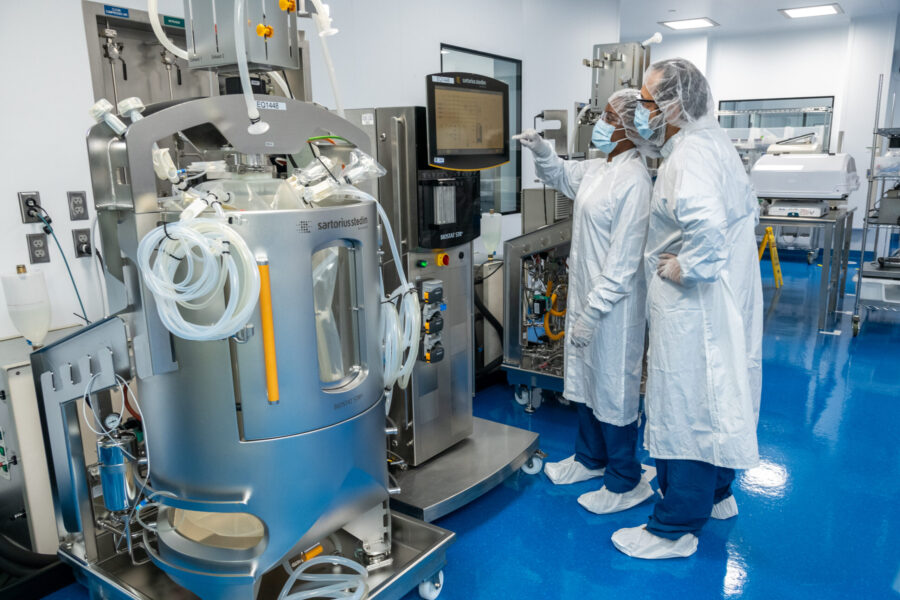Why Abzena?
Our focused approach.
A compelling recent article, “Bioconjugates Meet and Promise to Exceed Expectations,” from GEN News, explores the groundbreaking advancements and enhanced effectiveness of antibody-drug conjugates (ADCs) and bioconjugate technologies in cancer treatment and beyond.
One of the fastest-growing segments of pharmaceuticals, as highlighted at the 2024 J.P. Morgan Healthcare Conference, is the antibody-drug conjugate (ADC) segment. ADCs consist of four main elements: a monoclonal antibody (mAb) designed to target a particular cancer-associated antigen; an active, anticancer cytotoxic payload; a linker that cleaves off the payload inside cancer cells; and the conjugation technology that stably attaches the linker and payload to the antibody.
The first ADC, Mylotarg, was approved in 2000, and as of October 2023, 15 additional ADCs have been approved by the FDA for treatment of a variety of cancers. Examples include Enhertu, a HER2-directed antibody and topoisomerase inhibitor conjugate; Padcev, a nectin-4-directed antibody and microtubule inhibitor conjugate; and Trodelvy, a Trop-2-directed antibody and topoisomerase inhibitor drug conjugate. In addition, Padcev and Keytruda combination therapy was approved in 2023 for first-line treatment of adult patients with locally advanced or metastatic urothelial cancer.
The exciting potential of the field is exemplified by numerous high-profile, high-value deals such as the one between Roche and Medilink Therapeutics, the one between Pfizer and Seagen, and the one between AbbVie and ImmunoGen. Also, bioconjugates are rapidly expanding beyond ADCs and oncology. In bioconjugates, the biologic needn’t be an antibody. It can be a more complex molecule. And the payload needn’t be an anticancer drug. It can be some other kind of drug.
Next-generation technologies
The development of ADCs requires considerable expertise across biologics, chemistry, and manufacturing. Such expertise has been cultivated by Abzena, a CRDMO that provides services spanning drug discovery, development, and manufacturing to ensure that ADCs are produced that meet the desired target product profile and perform in vivo as anticipated with the appropriate quality attributes.
“We firmly believe that good data underpin good decisions,” says Louise Duffy, PhD, the CTO of Abzena. “Our stage-appropriate and extensive analytics and bioassay services cover each stage of development.”
The company’s proprietary solutions—including EpiScreen, Composite Proteins, Composite Human Antibodies, AbZelect, AbZelectPRO, ThioBridge, and LabZient™ are designed to provide the best chance of clinical and commercial success.
Complex drugs, ADCs combine the specificity of mAbs with the potency of small-molecule drugs, allowing targeted delivery of cytotoxic payloads to cancer cells. Their success relies on the careful design of key components, including the antibody, linker, and payload.
First-generation conjugation technologies have several shortcomings such as heterogeneous DAR and linker instability. Other limitations are exemplified by maleimide conjugation where there is a risk of the linker payload detaching and reattaching to free cysteines in vivo (retro-Michael reaction), reducing ADC efficacy. In the case of lysine conjugation, indiscriminate conjugation across the whole antibody can interfere with binding to the cancer antigen or the Fc receptor functions.
Duffy emphasizes that variable DAR makes it challenging to develop an efficient and robust manufacturing process. The next-generation ThioBridge conjugation technology can provide a more uniform DAR profile. Unlike maleimide conjugates, the ThioBridge conjugation technology preserves the covalent integrity of the disulfide bridges within the antibody and does not deconjugate or cross-conjugate, maintaining the structure of the ADC. The linker attachment to the antibody via its three-carbon bridge ensures stability, resulting in improved pharmacokinetic properties and, ultimately, improved efficacy.
Furthermore, ThioBridge is compatible with various payload classes and enables architectural design flexibility for linker-DAR-payload optimization. This enables more streamlined and cost-efficient production of ADCs.
